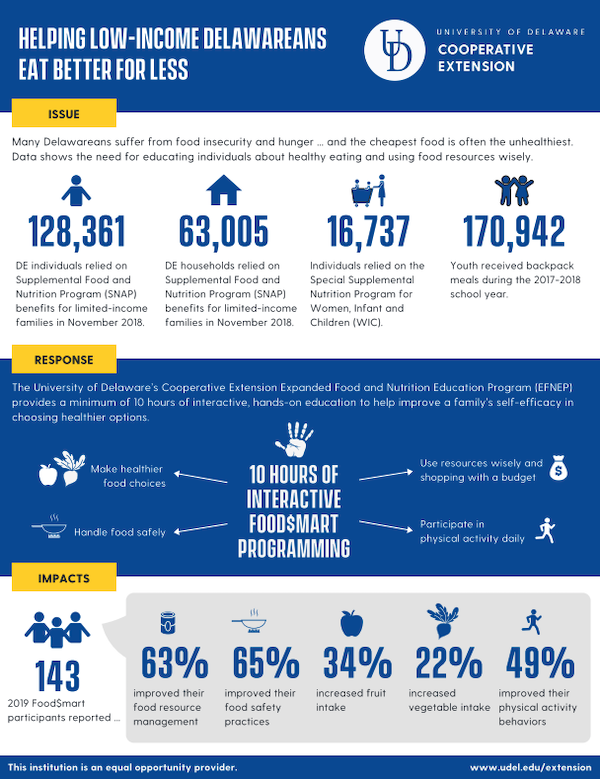
Helping Low-income Delawareans Eat Better for Less (2019)
- Ask Extension
- Health & Well-being
-
Agricultural Programs
- Agribusiness
- Animal Science
- Beginning Farmer Program
- Commercial Crops
- Commericial Horticulture
- Delaware Soil Testing Program
- Disease Management
- Farm Vitality and Health Project
- Irrigation
- Nutrient Management
-
Insect Pest Management
- Insect Trapping Program
- IPM Hot Topics
- Commercial Field Crop Insect Management
- Commercial Field Crop Disease Management
- Commercial Fruit & Vegetable Crop Pest Management
- EIPM Implementation Projects
- Pollinators
- Research and Extension Demonstration Results
- Brown Marmorated Stink Bug (BMSB) Management, Research, and Resources
- Publications
- Pesticide Safety Education Program
- UD Plant Diagnostic Clinic
- Variety Trials
- Weed Science
- Certified Crop Advisor Program
- Poultry Biosecurity
- 4-H
-
Horticulture
- Climate Variability and Change
- Delaware Soil Testing Program
- Forestry
- Lawn and Garden
- Master Gardeners
- Master Naturalist Program
-
Nutrient Management
- Nutrient Management Certification
- Continuing Education for Nutrient Management
- Nutrient Management Planning Resources
- Commercial Nutrient Handler Resources
- Poultry Litter and Manure Management
- Turf Management
- Agriculture Notebook
- Horticulture Handbook
- Agriculture & Horticulture Handbooks
- Crop Production
- Soil Fertility
- Delaware Climate Change Coordination Initiative (DECCCI)
- Salt Impacted Agricultural Lands
Helping low-income Delawareans eat better for less (2019 impact video): youtube.com/watch?v=keEf82utZao

ISSUE
Many Delawareans suffer from food insecurity and hunger and the cheapest food is often the unhealthiest. The number of individuals and households receiving SNAP benefits in Delaware during November 2018 was 128,361 and 63,005, respectively. In Delaware, 16,737 individuals rely on the Special Supplemental Nutrition Program for Women, Infant and Children (WIC). The Food Bank of Delaware also reported that 170,942 youth received backpack meals during the 2017-2018 school year, the largest number of backpacks distributed to date. This data shows the need for educating individuals about healthy eating and using food resources wisely.
RESPONSE
The University of Delaware’s Cooperative Extension Expanded Food and Nutrition Education Program (EFNEP) provides a minimum of 10 hours of interactive, hands-on education. The program focuses on developing participants’ skills to make healthy food choices based on their budget, to use their resources wisely, to handle food safely, and to participate in physical activity each day. The program helps to improve a family’s self-efficacy in choosing and preparing healthier food options.
IMPACT
In 2019, a total of 143 individuals participated in Food$mart, an EFNEP series of lessons. Sixty-three percent of participants improved one or more food resource management skills. This includes planning meals in advance more often (36%), comparing prices when shopping more often (23%), using a grocery list (32%), and cooking dinner at home more often (28%). Sixty-five percent showed improvement in one or more food safety practices.
Based on data from pre and post-program surveys completed by individuals upon entering and exiting the program, positive changes were seen in the number of participants increasing fruit (34%) and vegetable (22%) intake with 34% eating dark green vegetables more often each week. In addition, 49% of participants showed improvement in one or more physical activity behaviors. This includes 23% exercising for at least 30 minutes more days a week and 32% making small changes to be active more often. EFNEP is funded through the USDA's National Institute of Food and Agriculture.
The University of Delaware is an Equal Opportunity Institution and Provider. Visit UD’s Office of Equity & Inclusion to learn more.
Additional Links
531 South College Avenue Newark, DE 19716 (302) 831-2501
